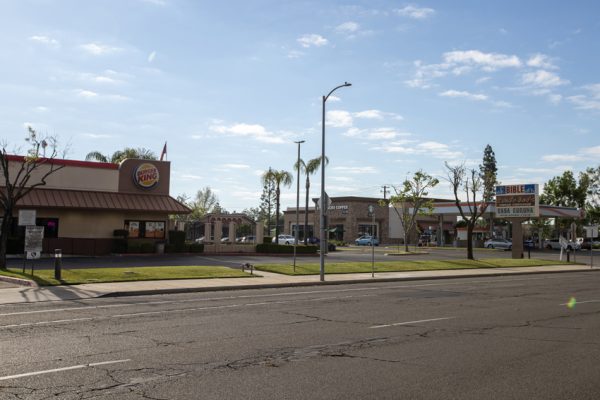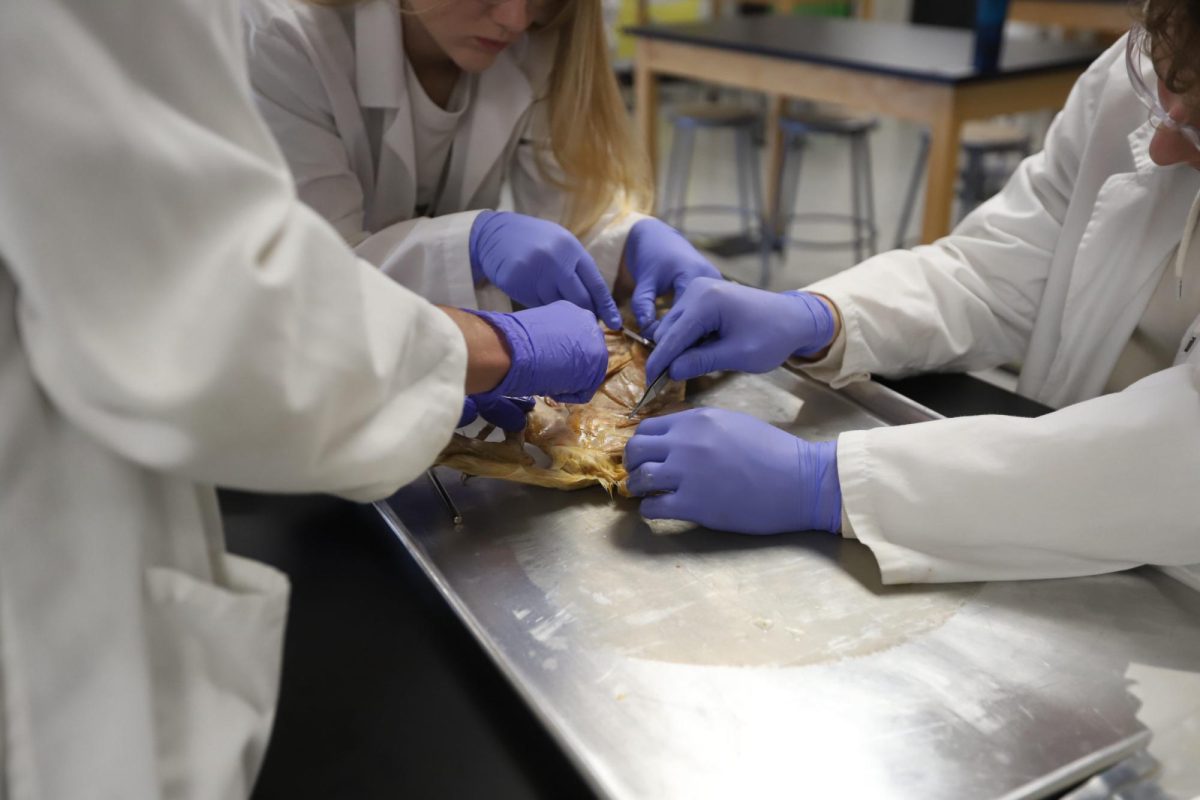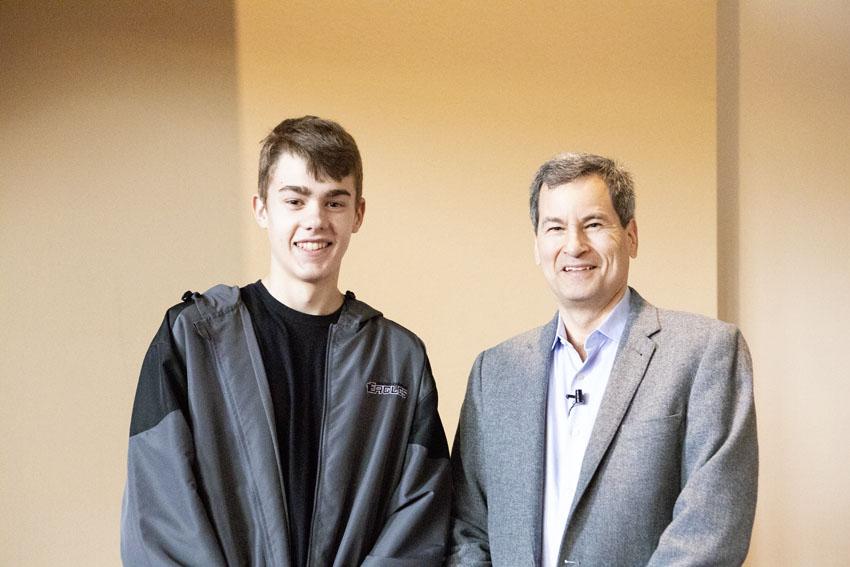Technology writer sees devices’ effect on society

Columnist for The NY Times, correspondent on CBS Sunday Morning and bestselling tech author, David Pogue, lectured at the latest SJV Town Hall, Feb. 20. Pogue shared how smartphones, the Internet of Things, robotics and the rest of today’s technology is changing the way we live, and whether we ought to fear this change.
Pogue started his career in neither journalism nor technology, but as an arranger and composer for Broadway musicals. He wrote his first tech review about Finale, a music software, when he heard the developers gave it to reviewers for free. By the time The New York Times hired him in 2000, Pogue was working as a full-time writer.
Pogue writes about more than tech reports, however. His features on Sunday Morning and Nova often look at the effect computers, robots and the internet have on society. He says that his grandfather shaped some of his perspective on this question.
“I remember my grandfather, my grandfather died at 107, he lived through everything,” Pogue said. “Born in 1890, he saw the first car, the first radio, the first airplane, the first computer, the first cell phone, the first telephone, the first everything. He told me that when he was a kid, his parents used to say, ‘Don’t sit in front of that radio, you’ll rot your brain.’
“For you, it’s, ‘Put down your screen, you’ll rot your brain, be social,'” Pogue continued. “Every generation has their technological bug-a-boo, but we always somehow muddle through. Here we are, you guys aren’t juvenile delinquents, obviously, so somehow it must be okay.”
Smartphones and personal computers are not the only devices contributing to technological change in today’s world. Pogue says that tiny, inexpensive electronic components, like the iPhone’s sensors, allow automation to spread into nearly every area of daily life.
“Devices like this are also part of what’s changing,” Pogue said. “Now, we’re able to smarten up virtually everything, just by putting these tiny, cheap sensors in there, including this whole field called the Internet of Things. What it means is that they’re putting wifi wireless sensors into ordinary, household objects; your washer, your dryer, your doorbell, your garage door.
Best known for his analysis of new consumer technology and trends, @nytimes columnist David Pogue speaks at @SJVTownHall today, Feb. 20. Be sure to check back next week as @brycer_f recaps his #thefeather interview and @Pogue‘s lecture. #SJW2019 #EverydayJournalism #realnews pic.twitter.com/ev1A6G6ypw
— The Feather Online (@thefeather) February 20, 2019
Pogue does not believe every piece of new technology will make an impact. He predicts virtual reality technology will lose precedence over augmented reality, as the practical applications of AR greatly outnumber those of VR.
“The problem with virtual reality is that it’s so isolating,” Pogue continued. “It undoes the one redeeming thing of video games, which is you’re doing it with your friends. I think the under-hyped new technology is augmented reality. The possibilities of this are really endless.”
In addition to the Internet of Things and augmented reality apps, a third field unlocked by smart sensors is robotics. Pogue says that the robots of today are finally starting to catch up with the robots he pictured as a child.
“I’ve always been a fan of robots since I was four years old,” Pogue said, “but I always thought robots would be like C3PO, like humanoid and walking. Well, there’s a reason those kinds of robots didn’t exist: it is incredibly hard to balance on two feet! You have three different systems, you can feel the pressure on your feet to know if you’re off-balance, you have your inner eyes, and you have your eyes to see the horizon. You would have to rebuild all that in a mechanical form to create a robot.”
The hardware for humanoid robots, and the artificial intelligence software developed for them, are also employed in self-driving cars, automated grocery stores and delivery drones. Pogue believes that cars will continue to become more automated, and envisions them replacing taxi and Uber drivers.
In the following podcast, Bryce Foshee talks to David Pogue about today’s technology at SJV Town Hall, Feb. 20
“Most of the accidents that happen with self-driving cars are when humans are driving,” Pogue said. “So Google’s next prototype eliminated the steering wheel. And already at this stage, you are seven times more likely to die in a car crash if you drive yourself than if trust one of these self-driving cars. I know a lot of people don’t believe that, and other people are like, ‘They’re going to pry my steering wheel out of my cold dead hands,’ but they’re already way safer.
“But the real mind-blower is not self-driving cars,” Pogue continued. “The mega mind-blower is when you combine the self-driving with the Uber concept. Ford, GM, Uber, Tesla, Lyft, are all rapidly working on self-driving taxis. The effect of this, if you really think about it, is so profound, there are so many things in life that are designed to accommodate our bad driving.”
“Car insurance companies are flipping out. When these cars can drive two feet apart at 80 miles an hour, and never have an accident, who needs insurance?” —David Pogue
Self-driving cars and other automated machines promise to make life easier, but many economists fear the results of robots taking human jobs. Pogue cited a study by Oxford, which found 47% of today’s U.S. jobs are likely to be replaced by automation within 20 years. However, he says that robots replacing retail, transportation and even medical occupations will not lead to a bleaker future.

“There is a huge argument for optimism,” Pogue said. “It’s not that we won’t be doing anything, it’s that we in 2019 can’t imagine it! We can’t see the future. It’s going to be something, we just don’t know what it is yet. We know it won’t be serving fast food or driving taxis, that stuff will be automated. The point is, we always tend to over-predict the technological doom, the technological advancing of the future. We always think it’s coming faster than it does, and we always think the effects are bigger than it turns out to be.”
Pogue shared his own prediction of tomorrow’s society.
“The bottom line, what I think what will happen, is yes, there will be a slight decrease in total employment,” Pogue continued, “not as bad as the what doomsdayers say, and meanwhile productivity will be going way up. We have to acknowledge that change is always scary, in every generation, no matter whether it’s you, your parents, your grandparents, every new technological development, every one, has been terrifying.”
True to his musical background, Pogue ended the speech with a live performance of his original song, “I want an iPhone.”
For more articles, read Scholastic Journalism Week comes to a close, Feb. 22 and COLUMN: Former Feather editor thanks advisers.
Bryce Foshee can be reached via Twitter @brycer_f or via email.











![[Video] 100th CSPA Spring Journalism Conference](https://thefeather.com/wp-content/uploads/2024/04/20240308-cspa-crown-002.jpg)






Alexis Baker • Mar 1, 2019 at 9:53 am
Very cool! This article is packed full of information! Good job, Bryce!
Robert • Feb 25, 2019 at 9:18 pm
Great article Bryce! David Pogue is a very interesting person!